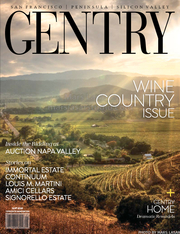Cultivating Luxury | Immortal Estate’s quest for perfection.

It is safe to say that Immortal Estate founder Tim Martin has gleaned his share of knowledge of Northern California wine terroir over the years. Early in his career he held positions with Lail Vine-yards before starting several enterprises, including Tusk Estates, whose coveted vintages are only sold to friends-of-friends, with a 10-year waiting list. But when Martin first visited the Sonoma County vineyard that he and his partners would buy and rebrand as Immortal Estate, he knew the moment he turned off the road from Spring Mountain that this place was something different.
“When you turn to the left,” he explains, “you drive Indiana Jones style for about a mile, deep into the woods. Further into the mountains . . . you’re in the jungle. There are no vineyards around, it’s not your typical bougie thing that’s been built.”
The steep spot where Immor-tal’s vineyards grow appears on a 19th-century stagecoach map, identified with the inscription “Impassable Mountain.” Today it remains inaccessible during rainy season; the property is not normally used to host visitors. What makes the place distinctive is a natural spring that feeds the property’s ponds, and the 55Ë slope that had been terraced and planted by the prior owners in the 1990s, a far steeper incline than would be permitted today under county regulations.
That terroir, which produced Cabernet that garnered a 100-point score from Robert Parker, is what convinced Timothy Milos, the winemaker who had crafted that wine, to accept Martin’s offer to continue as winemaker under the new ownership, with an eye toward greater successes ahead.
“Someone said to me, ‘How do you get better than a hundred points?’” Martin says. “Points are very arbitrary, very subjective, one person’s opinion. I respect it and appreciate it, but I believe that you should always be striving to do more, and what I know is that this vineyard can actually do better, and so did Timothy.”
As Martin speaks, his fiancée Jessica Biggins, who handles the marketing side of the business, pours from a decanter a glass of Immortal Estate’s 2014 Impassable Mountain Cabernet. A welcome spiciness is notable on the mid-palate. Just a couple of weeks earlier, Immortal had released its second label, a more fruit-forward mountain Cabernet called Slope, at a more accessible price point than Impassable Mountain.
“You see vineyards like this in Europe,” Martin says of the steep terraces, recalling time he spent in Bordeaux with winemaker Philippe Melka. “You don’t see them here. One of the things we’re doing is going through all the blocks, and the ones that are good but not great, we’re ripping them out and starting over.” The plan is to re-plant the whole vineyard over the next 10 years or so, taking greater care with the selection of root stock and clones than Martin believes was done for the original planting.
As we sip our Slope, talk turns to the conditions the Northern California wine country has endured over the past couple years: wildï¬res and, more recently, ï¬ooding. Martin views such events philosophically as part of what makes his job a happy challenge.
“Generally, if you’re making a luxury good—a car, a watch—you’re doing it in the containment of a shop, and you can control all the elements. We’re still subject to Mother Nature. Wine is unique in the luxury space, in that a good portion of the entire project is completely not in your control. Therein lies part of the adventure and fun,” he says. “And also for us, a lot of the stress. It keeps everyone in this industry on our toes.”
